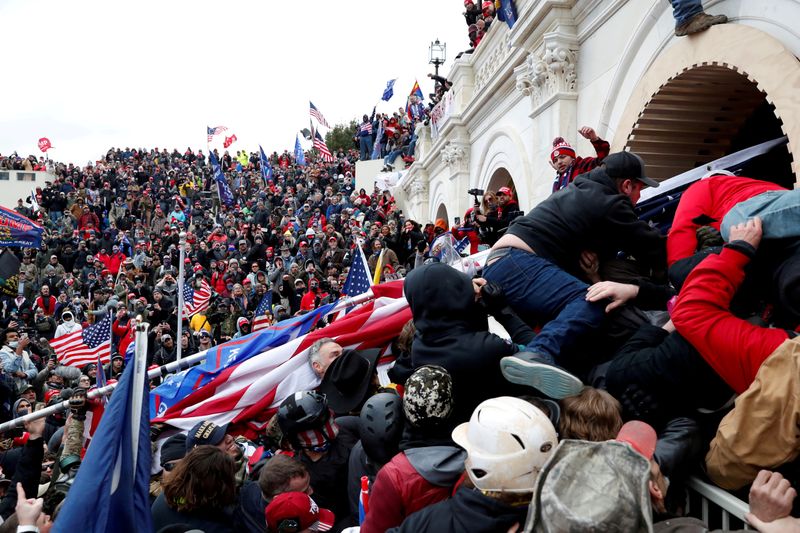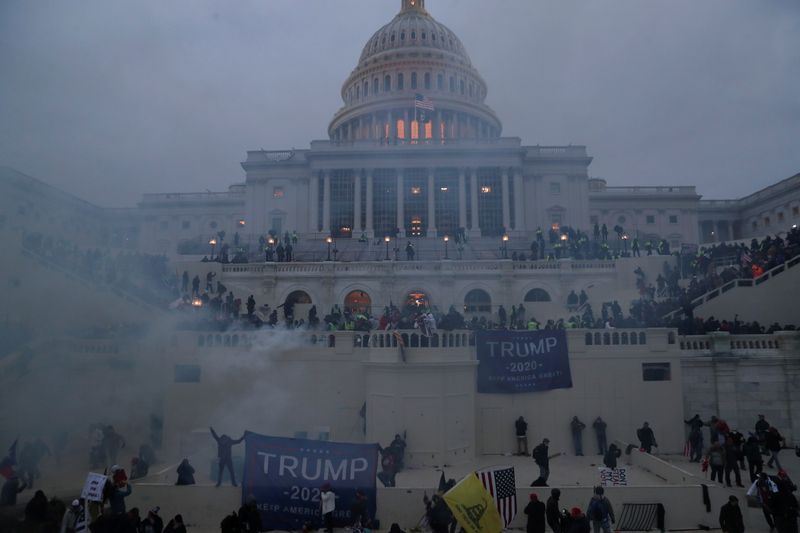By Sarah N. Lynch
WASHINGTON (Reuters) - U.S. counterterrorism prosecutors are probing the crowd of President Donald Trump's supporters who stormed the Capitol last week, initially focusing on at least two men who equipped themselves with plastic zip ties - a common kidnapping tool.
The counterterrorism unit of the Department of Justice's National Security Division has taken a role in prosecuting Larry Rendell Brock of Texas and Eric Gavelek Munchel of Tennessee, who were charged with unlawful entry, violent entry and disorderly conduct after they were photographed in the Capitol wearing tactical gear and carrying plastic restraints, according to a statement and court papers released Sunday and Monday.
Their attorneys could not be immediately identified.
They are just two of at least 20 people so far charged in federal court and about 40 in the District of Columbia's local Superior Court for taking part in the violence at the Capitol on Jan. 6, which left at least five dead, including a police officer.
Counterterrorism officials are joining the investigation, as evidence mounts suggesting at least some of the rioters openly plotted to kidnap or harm lawmakers to block them from certifying Joe Biden as the country's next president.
The charges so far range from unlawful entry and firearms offenses to assaulting police and making threats. Federal prosecutors have said they are exploring other possible charges, from seditious conspiracy to murder and felony murder, after a Capitol Police officer who was assaulted by rioters later died.
At least some of the people who took part may have plotted in advance to carry out violent acts at the Capitol, based on intelligence reports by outside groups who monitored conservative social media platforms.
At least 25 domestic terrorism investigations have been opened into the incident, Democratic U.S. Representative Jason Crow said on Sunday, citing information from U.S. Army Secretary Ryan McCarthy.
A Justice Department spokesman did not respond to questions about how many of its ongoing investigations into the U.S. Capitol riots have a counterterrorism angle.
There has been considerable debate in recent years about whether the Justice Department has ample legal tools to prosecute domestic terrorism, which the law defines as "acts dangerous to human life" that are intended to coerce civilians, influence government policy through intimidation, or affect the conduct of a government by mass destruction, assassination, or kidnapping.
Tom O'Connor, a retired FBI agent who served on the Joint Terrorism Task Force, said he believes there should be a more specific statute with enhanced penalties for people who carry out acts of terrorism on U.S. soil.
"Congress needs to come together and actually amend the penalties for the definition of domestic terrorism," he said.
Michael German, a former FBI agent who is now with the Brennan Center for Justice, disagreed, saying there are already 51 separate crimes that can be charged in connection with domestic terrorism, on top of numerous other laws that can be used to prosecute violent far-right extremists.
He faulted the FBI for not cracking down on right-wing extremists sooner, saying some at the riots were probably repeat-offenders who felt emboldened since they had gotten away with it before.

"I am confident when they do the investigation they will find out it was not the first time those people committed an act of violence and already some of the people who have been charged have previous convictions," he said.
